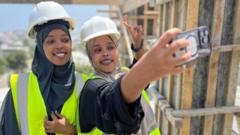In a daring divergence from traditional courtship methods, Ethiopia has witnessed the emergence of a bold reality TV dating show called "Latey: Looking for Love." In this unique series, ten women vie for the affection of Messiah Hailemeskel, a 38-year-old Ethiopian-American insurance agent based in Dallas. This romantic competition has become a cultural sensation, collecting over 620,000 views on YouTube and igniting conversation on dating customs in the more conservative East African nation.
The show’s concept mirrors popular Western dating formats, notably reminiscent of The Bachelor. Contestants engaged in various challenges, from boxing matches to bizarre advertisement pitches for mattresses, which is noteworthy in a country where romantic pursuits have historically been shielded from public scrutiny. Bethel Getahun, a 25-year-old contestant who ultimately won the show, expressed her feelings of surreal accomplishment during an interview with the BBC, calling her victory “a badge of honour.”
However, not everyone is supportive of this modern take on dating. Ethiopian vlogger Semere Kassaye critiques the show as a Western import, arguing that it reduces women to mere objects for acquisition. Some viewers echoed his sentiments, expressing concern over the potential cultural impact of public dating competitions. Critics wondered whether the show undermined the essence of Ethiopian courtship, which traditionally emphasizes privacy and familial involvement in relationships.
Despite the backlash, Bethel disagrees, asserting that Latey goes beyond mere competition to celebrate the diverse stories of women from various backgrounds. Throughout the season, the participants shared personal struggles, such as actress Vivian, who revealed her emotional journey fleeing Eritrea without reuniting with her mother for five years. Another contestant, Rahel, opened up about her sacrifices for her siblings after leaving school.
The show’s producer, Metasebia Yoseph, acknowledges that while Latey challenges cultural norms, it remains respectful by focusing on the innocent stages of dating rather than hyper-sexualized interactions. She encourages viewers to reflect on their cultural identity and virtues, suggesting that the show serves as a catalyst for broader dialogue within Ethiopian society.
Encouraged by its success and audience feedback, D!nk TV is already considering a second season, potentially allowing a female lead to select from ten men. Bethel, while navigating a long-distance relationship with Messiah, cherishes her bond with fellow contestants, referring to them as her newfound "sorority." She believes that Latey has not only highlighted the romantic aspects of Ethiopia but is also instrumental in promoting the evolving representation of women in Ethiopian media. It's a new lens through which the world can witness the stories and aspirations of women in the nation.
The show’s concept mirrors popular Western dating formats, notably reminiscent of The Bachelor. Contestants engaged in various challenges, from boxing matches to bizarre advertisement pitches for mattresses, which is noteworthy in a country where romantic pursuits have historically been shielded from public scrutiny. Bethel Getahun, a 25-year-old contestant who ultimately won the show, expressed her feelings of surreal accomplishment during an interview with the BBC, calling her victory “a badge of honour.”
However, not everyone is supportive of this modern take on dating. Ethiopian vlogger Semere Kassaye critiques the show as a Western import, arguing that it reduces women to mere objects for acquisition. Some viewers echoed his sentiments, expressing concern over the potential cultural impact of public dating competitions. Critics wondered whether the show undermined the essence of Ethiopian courtship, which traditionally emphasizes privacy and familial involvement in relationships.
Despite the backlash, Bethel disagrees, asserting that Latey goes beyond mere competition to celebrate the diverse stories of women from various backgrounds. Throughout the season, the participants shared personal struggles, such as actress Vivian, who revealed her emotional journey fleeing Eritrea without reuniting with her mother for five years. Another contestant, Rahel, opened up about her sacrifices for her siblings after leaving school.
The show’s producer, Metasebia Yoseph, acknowledges that while Latey challenges cultural norms, it remains respectful by focusing on the innocent stages of dating rather than hyper-sexualized interactions. She encourages viewers to reflect on their cultural identity and virtues, suggesting that the show serves as a catalyst for broader dialogue within Ethiopian society.
Encouraged by its success and audience feedback, D!nk TV is already considering a second season, potentially allowing a female lead to select from ten men. Bethel, while navigating a long-distance relationship with Messiah, cherishes her bond with fellow contestants, referring to them as her newfound "sorority." She believes that Latey has not only highlighted the romantic aspects of Ethiopia but is also instrumental in promoting the evolving representation of women in Ethiopian media. It's a new lens through which the world can witness the stories and aspirations of women in the nation.




















